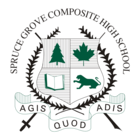Sports Medicine is a great subject for students interested in fields such as medicine physiotherapy, occupational therapy, chiropractic medicine, kinesiology, fire fighting, EMT, massage therapy, nursing, physical education, coaching or basic first aid.
Sports Medicine
Sports Medicine 15
Prerequisite: None
5 Credits
This is an elective course consisting of 5 CTS modules.
This course offers a logical beginning for those students interested in fields such as:
- Medicine physiotherapy
- Occupational therapy
- Chiropractic medicine
- Kinesiology
- Fire fighting
- EMT
- Massage therapy
- Nursing
- Physical education
- Coaching
- Basic first aid
There is a fee for this course to cover the cost of taping supplies and certificates that the students receive.
Students:
- Examine the determinants of good health in Canadian Society and factors affecting the dimensions of health. Students develop an understanding of the basic principles of anatomy and physiology and disease related to the human body.
- Learn the importance of nutrition and hydration for the promotion and maintenance of lifelong health. Students evaluate food and supplement choices, the effects of activity on nutritional requirements and labels to improve daily nutritional intake.
- Acquire the knowledge and skills necessary for the promotion of a healthy musculoskeletal system. Students study the structure and function of the musculoskeletal system.
- Learn prevention, assessment and management techniques related to sport injuries. Students develop an appreciation for the role of the first aider as it pertains to the sports medicine team.
- Explain and demonstrate the basic taping and wrapping techniques, and explore the role of the athletic therapist and be able to identify and treat the common injuries.
Sports Medicine 25
Prerequisite: Sports Medicine 15
5 Credits
This is an elective course consisting of 5 modules that build upon the information presented in Sports Medicine 15.
Students:
- Explain the role of food and hydration in helping athletes achieve optimal performance for sports. They acquire knowledge and skills to plan effectively for nutrition and hydration related to a variety of athletic events.
- Learn prevention, assessment and management techniques specifically related to bone, joint, soft tissue injuries that may occur during sporting events. They have the opportunity to practice taping and wrapping skills using a variety of techniques.
- Acquire the attitude, knowledge and skills for the promotion and maintenance of a healthy cardiovascular system. Students study the pathology of cardiovascular conditions, and gain an appreciation for practicing a healthy lifestyle.
- Students develop project design and management skills to extend and enhance competencies and skills in other CTS courses through contexts that are personally relevant.
